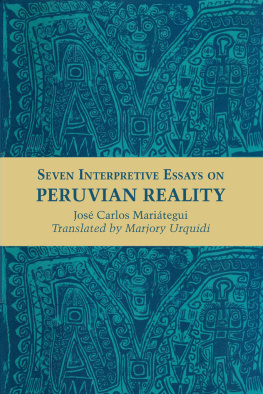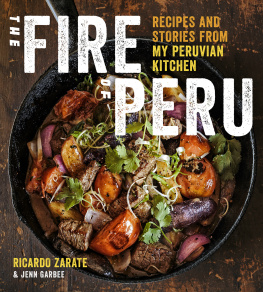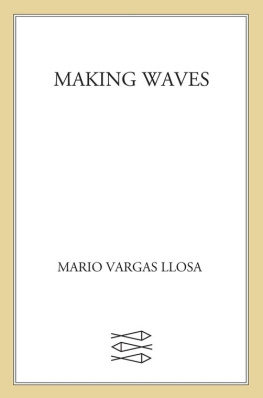THE TEXAS PAN AMERICAN SERIES
seven interpretive essays on
PERUVIAN REALITY
BY JOS CARLOS MARITEGUI
TRANSLATED BY MARJORY URQUIDI
INTRODUCTION BY JORGE BASADRE
UNIVERSITY OF TEXAS PRESS
AUSTIN
The Texas Pan American Series is published with the assistance of a revolving publication fund established by the Pan American Sulphur Company and other friends of Latin America in Texas. Publication of this book was also assisted by a grant from the Rockefeller Foundation through the Latin American translation program of the Association of American University Presses.
International Standard Book Number 0-292-70115-2
Library of Congress Catalog Card Number 73-156346
Copyright 1971 by the University of Texas Press
All rights reserved
ISBN 978-0-292-76265-7 (library e-book)
ISBN 978-0-292-76266-4 (individual e-book)
doi: 10.7560/701151
INTRODUCTION
Until a short time ago, it was believed that Jos Carlos Maritegui was born on June 14, 1895, in Lima. Recently, Guillermo Rouilln uncovered the fact that he was actually born in Moquegua in 1894.
Maritegui at first went unnoticed in the printing room of the newspaper. He often had to go to the editors homes to pick up their manuscripts. During this period he walked a great deal around the city, in spite of his lame leg. Sometimes he went by streetcar and was able to use those trips to read. He also wrote, having begun with the patriotic and religious poetry he composed at school. Little by little he rose in La Prensa. For a while he was assigned to classifying telegrams from the provinces, writing police and fire reports, and other secondary jobs. In 1914 the new journalist became known. He popularized his pen name, Juan Croniqueur, by writing verses, theater, art, and book reviews, stories, local news items, and occasional commentaries on national and international events. He also contributed in 1914 to the journal Mundo Limeo, which was intended for an aristocratic public. He soon made many friends among his colleagues, of whom the best known at that time was Abraham Valdelomar. Also in this group was Csar Falcn, who was long to accompany Maritegui in his life and ideas. All these writers and others of his contemporaries approached journalism from an aesthetic point of view.
In 1915 Maritegui became co-director of the journal El Turf. Here he tried to create a new type of literature, not only by means of light and ironic reports and social news, but also through poems and stories about horses. He stayed with El Turf until 1917. In 1915 and 1916 he also contributed to the journal Lulu, which was aimed mainly at a public of society girls and young intellectuals. In 1915 he was one of the initiators and founders of the Circle of Journalists, the first attempt made in Lima to gather together the men of his profession as a group.
Mariteguis literary personality also found expression in the theater. January 12, 1916, marked the opening in Limas Coln Theater of the scenic poem Las Tapadas, which he wrote in collaboration with Julio Baudouin (Julio de la Paz), with music by La Rosa. Its theme is derived from the classic Spanish theater, its music is mediocre, it has no value as theater, its scenery is taken from a puppet show; but it has unquestionable literary merit, wrote an independent critic, Alfredo Gonzlez Prada, in Colnida. The polished, elegant, flowing, graceful verse of Juan Croniqueur, he added, is delicately modern in style within a classic savoir-faire. Actually, the author was not trying to revive a classic style, but to imitate the poetic theater in verse cultivated in Spain in the first two decades of the twentieth century by Eduardo Marquina and Francisco Villaespesa, which was characterized by sonorous poetry, high-flown sentiments, and a pseudohistoric setting.
Las Tapadas (parodied as Las Patadas by Florentino Alcorta in his newspaper, El Mosquito) was not Mariteguis only theatrical venture. Toward the end of 1916, in collaboration with Abraham Valdelomar, he finished writing the scenic poem La Mariscala. This work was never produced and only fragments of it, which appeared in El Tiempo, are known. Also in 1916, Maritegui announced his completion of a book of poetry, Tristeza, which was never published. His sonnets Los salmos del dolor, printed in the literary journal Colnida, were taken from that collection. The three sonnets were Plegaria del cansancio, Coloquio sentimental, and Insomnio. In one of them he describes himself as a child both somewhat mystic and somewhat sensual. In another, in reference to an unhappy love affair, he speaks of another shadow of sorrow in my life.
A new daily newspaper, El Tiempo, published its first numbers in Lima on July 17, 1916, and it was dedicated to firmly opposing the conservative government of Jos Pardo. Some of its writers, among them Maritegui, had voluntarily left La Prensa, He was extremely active on El Tiempo between 1916 and 1919. He wrote a daily section of humorous political comments entitled Voces, in which he went over the events of each day, parliamentary affairs, and current gossip and rumors, real or imagined. It is very possible that his experience as author of Voces contributed to his skeptical attitude toward Perus political life. His pseudonyms also appeared on other pages of El Tiempo under such sections as Lunes Literarios, where he printed some of his stories about horses. In Ecos Sociales, Juan Croniqueur occasionally signed a gallant tale or commentary alluding to ladies of the aristocracy. Any incident, however painful or deplorable, could suggest a story to him, as with his Teora del incendio. In one of his Cartas a X he praised Manuel Ugarte for his anti-imperialism, adding that our race is not one of apostles, that we are too apathetic, and that although contemporary champions of the Indians are not drawn and quartered like Tupac Amaru, they are ignored. And when in February, 1916, a jealous rival shot to death the poet Leonidas Yerovi, Maritegui published in El Tiempo his Oracin al espritu inmortal de Leonidas Yerovi, which began with these words: I, who am your brother in pain and laughter, in faith and disbelief, in toil and reverie, in apathy and violence, in love and egotism, in sentiment and intellect, in the human and the divine, I invoke you, Yerovi, in this hour of anguish.
When the Pardo Government founded the newspaper El Da in 1917, Maritegui tried to create a humorous counterpoint, La Noche, but it lasted only a short time.
Also in 1917 he received the Municipalidad de Lima prize from the Circle of Journalists for his article La procesin tradicional, which appeared in El Tiempo on April 12 and described Limas popular religious procession in honor of Our Lord of Miracles. Always respectful of religion, he was inspired by a brief retreat in the monastery of the discalced friars to compose the sonnet Elogio de la celda asctica.
Nevertheless, Maritegui and other writer friends provoked an uproar when they went to the cemetery on the night of November 4 to watch Norka Rouskaya, an Argentine dancer, perform to the strains of Chopins Funeral March. The principals of this incident were jailed for a short period. Maritegui and his friends, in various Lima newspapers and before congress, vehemently claimed that they had not meant any irreverence by their action, that the cemetery had been used for much more reprehensible purposes, that they were being attacked through ignorance, superstition, or narrowmindedness by critics who were themselves no models of moral rectitude, and that it had been simply an artistic performance.
But Maritegui was gradually changing in spirit. On June 22, 1918, under the influence of Luis Araquistains militant journal
Next page









